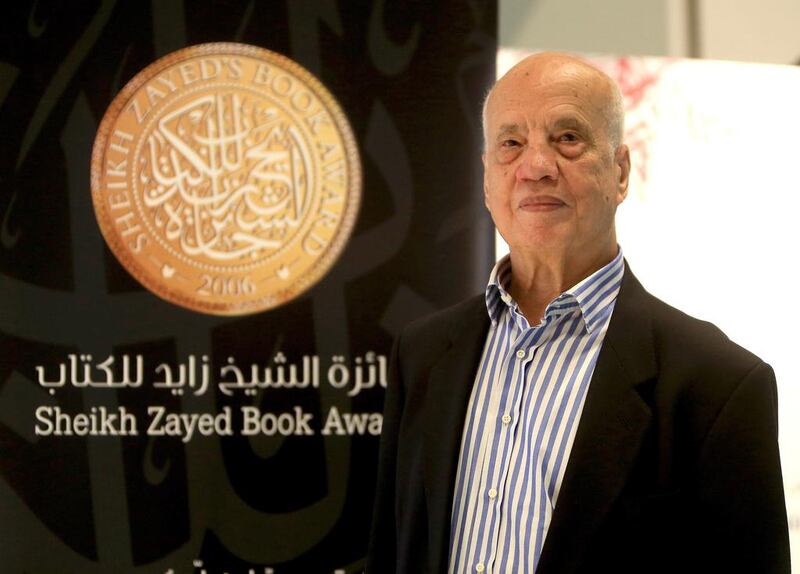Abdul Rashid Mahmoudi believes he has always been a bit lucky.
In 1961, at the age of 25, this young man from a small village was chosen by the Egyptian government to be part of a student delegation to be sent abroad for graduate studies.
“I stood there onstage, shaking the hand of president Gamal Abdel Nasser,” Mahmoudi recalls of the day of his graduation from Cairo University. “He was a big man, massive, an imposing figure. My hand fell into his hand and I was tongue-tied. I didn’t know what to say to this bigger-than-life figure who smiled and congratulated me, wishing me luck on my trip to the UK where I was to study philosophy.”
Now, 53 years later, at the age of 78, the poet, writer, translator and academic, who also worked at Unesco, won the Sheikh Zayed Book Award in the literary category, for his second novel, Ba'd Al Qahwa (After Coffee), published by Al Dar Al Arabiya in 2013.
“I am walking, living proof that it is never too late to become a writer,” he says with a laugh. “I am now famous. People know me and talk about my book. It is like a dream come true. But I am not going to stop here, I am already working on my third novel.”
He first wrote part of Ba’d Al Qahwa in the 1990s, then left it in a drawer until he rediscovered it while packing and moving back to Egypt. “I actually wrote the last part first … it is more of a trilogy and I bring into it many social fabrics and my experiences from living in a village in Egypt, then city life as well as experiences from Europe,” he says.
Born in 1936, Mahmoudi has lived through many eras and in many villages and cities in the Arab world, as well as in countries such as the UK, France and Austria, turning what he “picks up from corners of the streets” into properly developed stories and characters.
“I simply walk and listen and note down in my little notebook whatever captures my senses,” he says. “The one common thread in all my writing is music. I love music, particularly classical music, like Bach and Brahms, and so there will always be music in my stories.”
He initially named his book Layali Al Ons (Night of Good Times) after the song by the Syrian songstress Asmahan, but then the publisher found out there was a book with that title by an Iraqi writer. So the name was changed at the last minute to tie it to the last chapter, in which there is a scene about coffee.
It’s set in Ismailia and Vienna in the 1940s and we follow a character by the name of Methat, a “bit of a loser and a failure”, says Mahmoudi, as he interacts with numerous other characters, mainly women.
Dark humour, deep emotions, experimental prose, a peppering of classical Arabic narrative, simple Egyptian dialect dialogue, poems, proverbs, songs, and even verses from the Quran are skilfully interwoven to give the novel an overall melancholic feel, ending on an emotional cliffhanger.
“Our hero is torn between two women: an ideal woman he dreams of but can never get, and her sister who is available and he can get but doesn’t love,” says Mahmoudi. “The ending in many ways is a bit tragic, as we feel the confusion and the struggle of Methat to do something right for once in his life, but does he? I leave that to you to decide.
“I like to study female characters and challenge myself to write about them and give them a voice that both male and female readers could connect with,” he adds.
His wife is one of his sources of information on what women are like and how they would likely react to certain situations. “My family has always been supportive of my writing. They always believed in me.”
Mahmoudi’s win comes after two years of no prize being awarded in the literary category because the books submitted did not meet the set criteria. The Abu Dhabi Tourism and Culture Authority announced last week that his novel had won the Dh750,000 cash prize, from more than 340 entries.
Ba’d Al Qahwa was described by the awards committee as featuring “literary creativity, resembling international classical novels, manifesting brilliant narration skills, smooth transition between events, and the personification of characters from childhood to middle age.
“The novelist showed great skill in reconstructing reality, as well as an ability to analyse characters in their fluctuation from hope to emotional breakdowns, and a capacity in associating the real with the mythical in one frame.”
Mahmoudi’s return to a “very different” Egypt has put him in a very curious and contemplative mood. “It is a rough time for Egypt, but I believe in Egypt. There are many talents and people who want to bring back Egypt’s glorious days. I have seen so many changes, and each change brings with it hope and challenge, so we must not lose faith in Egypt.” Mahmoudi plans to incorporate the changes he has observed in Egypt in his new novel.
“The new one is called Lord Shaaban, another comical loser figure, that I wrote as a short story and am now building on and turning into a novel.”
Mahmoudi’s advice to any budding writers is simple: “Just listen.
“A real writer never actually runs out of ideas, as life is vibrant with ideas and characters. Sitting in the back of a taxi, a stroll through the street or souq, and simply sitting and watching people walk by and talk, all this and more are material for a novel.”
Rym Ghazal is a senior features writer and columnist for The National.
[ rghazal@thenational.ae ]





